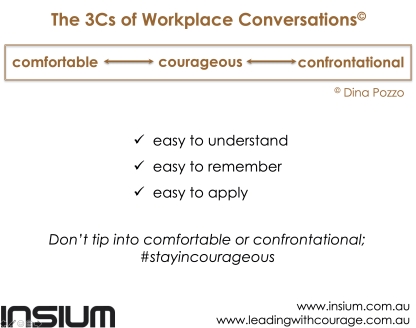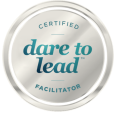Courageous Conversations 2.0 (based on the data from insium’s Workplace Courage Questionnaire)
insium’s Workplace Courage Questionnaire revealed that the following 3 workplace conversations need attention:
- Having a difficult conversation
- Delivering a difficult workplace message regarding workplace change
- Giving feedback to a more senior colleague
As a result of the data collected, we developed The 3Cs of Workplace Conversations (see below) and insium’s Courageous Conversations Workshop.
The overall aims of this workshop are to:
- Increase understanding of courage and confidence
- Increase awareness of own strengths and areas for development with respect to courageous conversations
- Increase awareness of own and other’s responses to courageous conversations
- Provide tools for immediate workplace implementation
- Build on the courage and confidence that already exists amongst participants
- Write a plan of action for immediate workplace implementation
More information about this workshop can be found here.

If you’d like to know more, please contact us.
My Courageous Self –
An evidence-based, practical workshop
The demonstration of courage provides a number of individual and workplace benefits. These benefits include the creation of positive energy and improved motivation; increased accountability, conscientiousness and empathy; increased resourcefulness and goal attainment; increased self-confidence; increased willingness to learn from mistakes; increased healthy relationships and inclusiveness; and increased inspiration to act courageously after witnessing acts of courage by others. As described by Robert Biswas-Diener, courage enables individuals to live a full life, and hence is a key contributor to wellbeing.
The key aim of this highly practical workshop is to heighten self-awareness of own courage. Participants will be invited to join in an appreciative discussion designed to build meta-knowledge of own past courageous acts, and will develop a plan to access this knowledge in future when needed. Additionally, through sharing stories, participants will broaden their own perspectives on courage.
Imagine the positive impact of your courageous self for you, for the colleagues with whom you work, for your family and friends. We know courage is contagious.
If you’d like to know more, please contact us.
Courageous Feedback
Having a tough conversation – including giving honest, productive feedback – is one of ten cultural issues identified by 150 c-suite global leaders as getting in the way of organisations today.
Why do people not have tough conversation? Why don’t they give feedback? Responses included a lack of courage; a lack of skill. More than half the leaders talked about the cultural norm of being “nice and polite” and not wanting to hurt others’ feelings. And the consequences of not giving feedback? A lack of clarity, diminishing trust and engagement, and an increase in problematic behaviour.
Dare To Lead™, Brené Brown
The overall objective of this programme is to enable feedback conversations, so that feedback is “just how we do things here.” So that everyone leans in and has feedback conversations, tough or otherwise.
To meet this objective, by the end of the programme, participants will have:
- An increased understanding of the impact of feedback on individuals, teams and organisations
- Explored the WOW Model – What, Outcome, Welcome – to give feedback
- Developed strategies for fostering a psychologically safe workplace
- Explored the 10 guidelines for giving engaged feedback
- Increased understanding of how your values shape the way you give and receive feedback
- Explored Living BIG – Boundaries, Integrity, Generosity
- Identified how your self-talk impacts how you give and receive feedback
- Identified how having a growth mindset facilitates a feedback conversation
- Recognised defensiveness in receiving feedback
- Practised giving and receiving feedback
- Developed a plan of action for implementation in the workplace
If you’d like to know more, please contact us.
Courageous Conversations 1.0
A conversation:
- an oral exchange of sentiments, observations, opinions, or ideas; Merriam-Webster
- a talk between two or more people in which thoughts, feelings and ideas are expressed, questions are asked and answered, or news and information is exchanged; Cambridge
Consider your workplace:
- Which conversations do you find comfortable to engage in; in fact, these conversations may feel quite effortless? Why is this? What attributes and strengths do you offer to these conversations? Who else is involved, and what do they offer? What are the beneficial outcomes of these conversations?
- Which conversations do you find challenging or difficult to engage in; to initiate? What is the impact of these conversations on your genuine expression of thoughts, feeling and ideas? What is the impact on your asking questions and listening with curiosity? What are the consequences of these conversations?
Challenging or difficult conversations come in all shapes and sizes. These include: speaking up in a meeting, speaking with a more senior colleague, giving feedback, receiving feedback, offering alternative opinions, providing space for others to challenge the status quo, delivering difficult messages, hearing difficult messages, saying no, managing poor performance, admitting mistakes. There is no doubt that as you read through these situations, you would have agreed with the challenge in having some of these conversations and not others; that there may also be other situations that you would add to the list.
insium’s highly-practical, evidence-based Courageous Conversations workshop explores:
- The conversations that you find comfortable and effortless
- The conversations that you find difficult to engage in and/or initiate
- How we can courageously express what we want and need
- How we can find the courage to ask questions with genuine curiosity
- How courage can enable us to listen more openly
If you’d like to know more, please contact us.
Courageous Change & Transitions
The key aims of this workshop are to:
- Identify and assess organisational changes, and associated real and perceived risks in order to successfully implement desired change
- Identify and understand your own role transitions to bring your best, courageous self to your team and organisation
Courageous Stakeholder Mapping
The key aims of this workshop are to courageously explore stakeholder relationships through the following lenses:
- Quality of relationships
- Communication in relationships
- Influence
- Energy flow
- Living BIG
- BRAVING Trust
Courageous Collaborations & Partnerships
The key aim of this workshop is to identify the characteristics and attributes of past successful collaborations and partnerships in order for future successful collaborations and partnership.
If you’d like to know more, please contact us.

